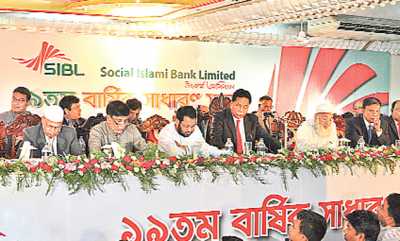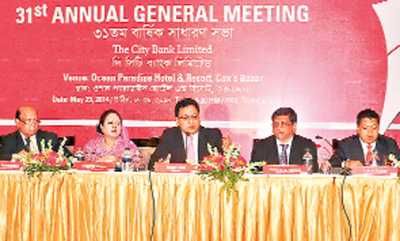SIBL declares 12pc cash dividend

Social Islami Bank Limited (SIBL) declared 12 percent cash dividend for its shareholders for the year ended on 31st December 2014.
The approval came at the 19th Annual General Meeting (AGM) of the bank held at Sunrise Community Center in Sylhet on Saturday, said a press release.
Major (Retd.) Dr. Md Rezaul Haque, Chairman of the Board of Directors of the bank presided over the meeting.
Directors of the bank were also present on the occasion.
Managing Director Md Shafiqur Rahman expressed sincere gratitude to the shareholders, clients and distinguished patrons for their cooperation and continuous support provided to the management during the year.
He stated that in 2013, SIBL maintained and achieved a stable position in all key areas of operations despite many challenges at home and abroad.
He further informed that SIBL will also attain a position with strong foundation to further achieve a robust growth in 2014 also by adopting a strategic business policy.
Deputy managing directors, head of branches, high officials of the corporate office and shareholders of the bank attended the meeting.
City Bank declares 20pc stock dividend

The announcement came at the 31th Annual General Meeting (AGM) of City Bank held at Ocean Paradise Hotel and Resort in Cox’s Bazar recently.
Rubel Aziz, Chairman of City Bank Limited, presided over the AGM, said a press release on Saturday.
Vice Chairperson Meherun Haque, Directors Deen Mohammad, Aziz Al Kaiser, Mohammad Shoeb, Hossain Khaled, Rafiqul Islam Khan, Aziz Al Mahmood, Evana Fahmida Mohammad, Syeda Shaireen Aziz, and Managing Director and CEO Sohail R. K. Hussain of City Bank Limited were present at the meeting.
A large number of shareholders attended the Annual General Meeting.
In his welcome speech, Rubel Aziz mentioned that 2013 was a solid and successful year for the bank despite overall uncertainties prevalent in the global economy and local political field.
The bank was able to maintain a steady financial growth despite several challenges like excessive liquidity, growth of non-performing loan (NPL) and subdued economic activities, he added.
The shareholders unanimously approved 20 percent stock dividend as recommended by the Board of Directors of the bank.
BB: Take actions against BASIC board
Muhith says the board will be ‘reformed in a short time’ 
Bangladesh Bank has recommended the government taking actions against chairman and board of directors of BASIC Bank for their alleged involvement with the bank’s Tk4,500 crore loan scams.
The central bank sent a letter to the finance ministry yesterday saying that the chairman and board of directors cannot avoid their responsibility in one of the country’s biggest credit forgeries.
In the afternoon yesterday at the Secretariat, Finance Minister AMA Muhith told the Dhaka Tribune that he had received the letter but was yet to read it.
He, however, said the board would be “reformed in a short time.”
Muhith said: “We cannot dissolve a board instantly. We have to wait until formation of another board of directors.” But Bank Division Secretary Dr M Aslam Alam declined to make any comment on the matter.
Although Bangladesh Bank had sent such letters earlier recommending actions against the present board of BASIC Bank, the finance ministry didn’t initiate any move.
Under the Bank Company Act, the central bank cannot take actions against bank officials appointed by the government. It can only report about the government-appointed chairman and directors to the government about their irregularities with recommendation to consider actions against the misdeeds.
Under a recent amendment to the law, Bangladesh Bank has already removed BASIC Bank Managing Director Kazi Faqurul Islam for the loan scams with a directive to halt lending in the bank’s Gulshan, Dilkusha and Shantinagar branches in Dhaka.
In a recent letter, finance ministry asked the central bank to stop loan activities in Gulshan branch of BASIC Bank and provide a review of all steps taken against the bank in last one year, said a senior executive of the central bank.
Following the instruction, Bangladesh Bank decided to suspend loan disbursement of the three branches, he said.
The central bank also sent a review of steps taken against the BASIC Bank over the last one year.
Sheikh Abdul Hye Bacchu is the Chairman of BASIC Bank’s board of directors while the members are Shubhashish Bose, Fakhrul Islam, Shyam Sunder Sikder, Neelufar Ahmed, Quamrun Naher Ahmed, Md Anwarul Islam and Anis Ahamad.
Investigations by Bangladesh Bank last year revealed that the Basic Bank had approved loans of Tk4,500 crore, mostly without proper documentation or scrutiny.
Most of the irregularities took place in four branches - Motijheel, Shantinagar, Dilkusha and Gulshan - that granted loans of Tk4,424.93 crore between December 2009 and November 2012 on poor documents and inflated mortgages.
The bank gave loans to nonexistent companies and promptly approved loans to clients after they had opened accounts. In September last year, a memorandum of understanding was signed between Bangladesh Bank and BASIC Bank to rein in the financial irregularities rampant in the state-run scheduled bank for the past few years.
But the central bank’s latest investigations still found irregularities continued at BASIC Bank, even as recently as January, which prompted Bangladesh Bank to slap a notice to the bank’s MD Kazi Faqurul asking why he should not be removed from his position.
Bank Asia, NRB Bank get approval for agent banking
Bangladesh Bank yesterday gave permission to two banks to provide agent-banking services, taking the banking sector one step ahead in financial inclusion.
Bank Asia can appoint 30 agents and NRB Bank 20 agents to extend modern banking services to clients, according to the central bank decision.
If the initiative to provide services through agent banking is implemented successfully, many small and medium enterprises will feel encouraged to start businesses in rural areas, Anwarul Islam, deputy general manager of the central bank, told The Daily Star.
It will spur employment generation and the tendency of the rural population to move to urban areas will decrease, Islam added.
On behalf of the banks, the agents can transact cash, distribute remittance, gather information for bank accounts, accept loan applications, transact and recover loans and receive applications for credit and debit cards.
Bank agents can also receive utility bills and passport fees and distribute government assistance under social safety net programmes.
However, if the agent commits any irregularity, the bank will have to bear responsibility, Bangladesh Bank said in a statement.
In agent banking, a third party signs an agreement with the bank and provides some banking services directly to the client on behalf of the bank.
Instead of setting up branches, the agent banking system has been accepted in many countries as a means of financial inclusion, according to the statement.
Agent banking has become popular in many developing countries in Asia, Africa and Latin America.
Earlier, Bank Asia launched agent banking under a pilot project by appointing eight agents in Sirajdikhan upazila, one in Louhajang and two in Srinagar in Munshiganj district. The agents have provided banking services to more than 2,000 clients.
World Bank sounds alarm on rising global food prices
WASHINGTON: World food prices rose in the first quarter of the year for the first time since their all-time high in August 2012, driven by rising demand in China, drought in the United States and unrest in Ukraine.
According to the World Bank internationally traded food prices increased by a sharp 4.0 percent. The leap was led by wheat and maize, up 18 percent and 12 percent, respectively.
As a result, international food prices in April were only 2.0 percent lower than a year ago and 16 percent below their record level in August 2012, the bank’s quarterly food price report said.
“Increasing weather concerns and import demand—and, arguably, to a lesser extent, uncertainty associated with the Ukraine situation—explain most of the price increases,” the report said.
World Bank economists said prices increased despite bumper crops in 2013 and continued projections of record grain harvests and stronger stocks expected for 2014.
Persistently dry conditions in the United States and strong global demand, particularly from China, partly explained the price rises.
But Ukraine, the breadbasket of eastern Europe, played a part, posting the largest domestic price increases for wheat and maize.
Ukraine, the world’s sixth-largest wheat exporter, saw domestic wheat prices jump by 37 percent, driven in part by currency depreciation.
Overall, international wheat prices soared by 18 percent quarter-over-quarter.
“Such a steep price increase had not occurred since the months leading to the historical peak in the summer of 2012,” the report said. —AFP



